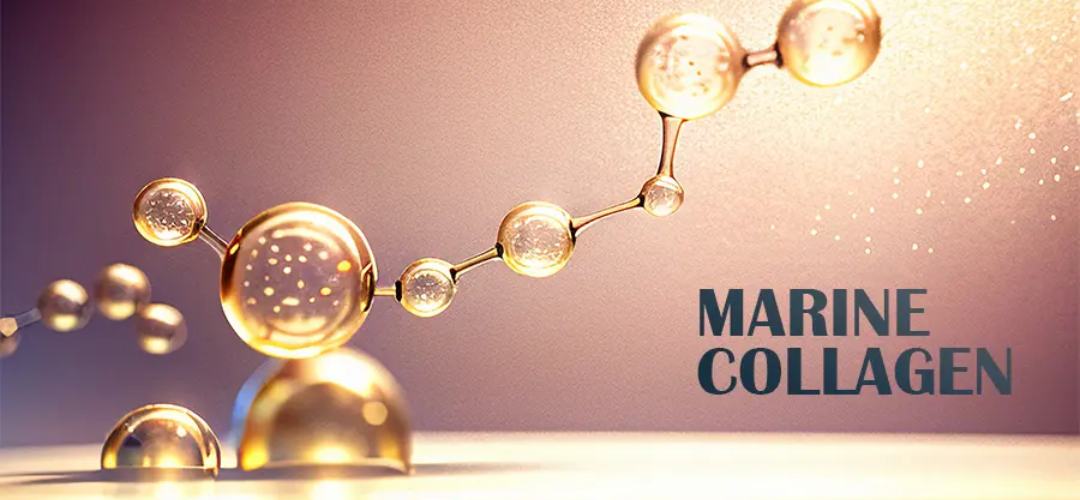Rightly described as “the glue that holds us together," collagen makes up around 30% of your body’s total protein. Let's talk about this.
Wrinkles started creeping in at an early age. Does your skin feel saggy or too dry? Protein deficiency may be the root cause of all. Our body is all about protein, carbohydrates, vitamins, and other nutrients. Fish consumers eat fish proteins, but what about those derived from fishery-based micro-sources such as scales or skin? However, collagen protein has become a dietary supplement and more of a flavour for its potential health benefits. According to Global Market Insights, the marine collagen market value crossed $1.1 billion in 2022, and it is estimated that its worth will triple by the end of the decade. Here’s everything you need to know about marine collagen.

What is Collagen, and What Does Eating It Do for You?
The collagen protein obtained from fish scales, skin, and marine invertebrates is known as marine collagen. Marine collagen, also known as fish collagen, is around 80%–95% collagen type I, which can repair and heal the body. Notably, it has been used in the cosmetic industry for many years due to its ability to enhance skin texture and provide beauty benefits. Collagen is a framework in skin composition, from bone structure, tendons, and ligaments to muscles and blood vessels. Collagen is the second-most crucial element of our bodies after water. Unfortunately, starting in our early 20s and onward, collagen production naturally decreases in the body annually by about 1.5%. This means that at 40, our collagen generation is reduced to more than 25%. As a result of the decline in collagen levels, such an effect can be pretty harmful to skin quality; it also affects joint operation and hair or nail strength. Similarly, this may even lead to digestion-related consequences, among other devastating measures that are often seen on older people’s bodies. Different aspects lead to such a decline, including environmental toxins, poor nutrition, excessive exposure to harmful UV rays, and impaired sleep. There are as many types of collagen in the human body, which is 28. Scientists suggest that natural collagen loss is associated with ageing and other factors, can potentially replenish this externally. As collagen is crucial in the skin's supporting structure, inclusion seems to validate wrinkles and sagging skin.
What are the Health Benefits of Marine Collagen?
-
Higher bioavailability: Marine collagen is a sustainable source of collagen protein, and compared to bovine collagen, it is more bioavailable. The higher bioavailability means it can be more quickly absorbed into the body, helping to show results faster!
-
Amino acid circulation: After the absorption of collagen, the chemical will break down into amino acids in circulation. The efficacy of this technique could be clearer due to the proposition by some researchers that these residues may lead to skin nibbles in collagen production.
-
Antioxidant properties: A review discovered that collagen peptides function as antioxidants to neutralise free radicals and cellular inflammation observed in skin cells with chronic illnesses and ageing.
-
Wrinkle reduction: A small study that included 50 women aged between 45 and 60 years taking marine collagen powder supplements for weeks reported a reduction in wrinkles compared to a placebo. Skin elasticity, hydration, and firmness were also furthered.
- Clinical trial results: In a double-masked, randomised clinical trial of 120 participants consuming a hydrolysed fish collagen supplement concomitant with vitamins, antioxidants, and compounds similar to glucosamine, there was an enhancement in skin elasticity by about 40% compared to a placebo. Subjects claimed a 43 per cent lower joint pain and an additional increase of approximately 39 per cent in joint movement.
What is the Difference Between Collagen and Marine Collagen?
This collagen type is considered the most bioavailable of all collagen sources, including bovine and pigskin. The absorption rate of marine collagen is exceptionally high due to the compound's high bioavailability. Marine collagen is further hydrolysed in some products to improve absorption. The consumption of marine collagen is an excellent alternative for pescatarians and individuals who do not consume beef products.
Are there any Side effects of Marine Collagen?
Individuals with fish allergies should avoid marine collagen, as it is derived from fish sources. They consume marine collagen when allergic, which can lead to adverse reactions. Marine collagen is a protein supplement, and it's essential to recognise it as such. Suppose you are advised by your doctor to limit protein intake, primarily due to severe kidney disease. Monitoring and accounting for the protein grammes derived from marine collagen powders or capsules is crucial.
How Long Does It Take for Marine Collagen to Work?
It’s natural to want to notice the benefits of any collagen supplement or diet change right away, but you’ll have to wait some time. With regular consumption, you may see skin benefits in 8 to 12 weeks, which is enough time for skin to be repaired and turned over. If you want to try marine collagen, follow the instructions on the label for the dosage.
Key Takeaway
There's a sea of difference between taking marine collagen and enjoying a fresh fish feast. Fishy fact: collagen hangs in the skin, bones, heads, scales, fins, and even the less internal organs. However, you might miss the collagen party if you munch on small fish like sardines or anchovies.Opt for marine collagen peptides—the ultimate VIPs—already broken down for easy digestion. Just be a savvy shopper and compare the goodness of collagen in tablets versus food.
At Rawafed, we aim to deliver high-quality health products that are all-in-one, so you don't have to rush into the store. Order our Collagen-PRO X supplement, and let us know your experience!

